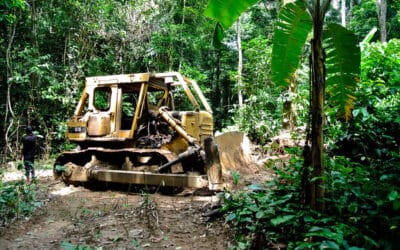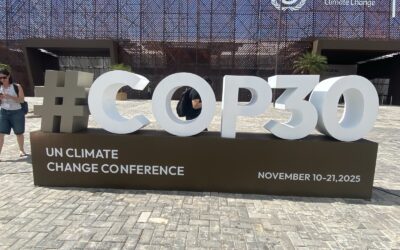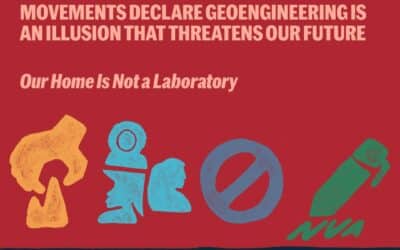15 Dec, Buenos Aires: The Global Forest Coalition (GFC) [1] celebrated the failure of two key trade negotiations, the World Trade Organization (WTO), and EU-Mercosur free trade agreement, to reach a successful conclusion during negotiations in Argentina [2]. Both were projected to have detrimental impacts on forests, food sovereignty, and rights of local communities, issues that GFC defends.
The WTO collapsed because of disagreements between the US and developing country’s like India, China, Brazil and others over public food stockholding [3], while the EU Mercosur Free Trade agreement was delayed to next year because of disagreements over ethanol and beef import quotas.
“The frequent failure of the WTO talks shows that we have moved to a different moment in the process of globalization where the main conflicts are moving from those between developed versus developing countries to between the biggest economies of the world.” said Mary Louise Malig, Campaigns Coordinator of Global Forest Coalition. Malig added that “The United States refusal to let developing countries have public food stocks and subsidies to guarantee their national food security shows that the WTO threatens peoples right to food. This is why social movements have always asked for the WTO to get out of agriculture.”
Mercosur countries Brazil, Argentina, Paraguay and Uruguay want the EU to improve its current offer of tariff free imports of meat from 70,000 tonnes and ethanol from 600,000 tonnes a year as they are lower than what the EU offered in 2004.
“The EU-Mercosur agreement will lead to serious deforestation in South America because of increasing exports of beef, ethanol and soy- all commodities which raze our forests. Combined with climate change and droughts, impacts will be catastrophic [4],” said Ines Franceschelli of Henoi Jey, Paraguay and co-author of a report on real cost of meat production [5].
The UNs 2016 State of the World’s Forests report [6] and GFC’s own reports [7] highlight that livestock and animal feedstock production are the main drivers of deforestation in South America. 71% of deforestation between 1990 and 2005 was driven by increased demand for pasture. In Brazil the figure was even higher, at 80%.
Dr. Simone Lovera, Executive Director of Global Forest Coalition added that “The UN Convention on Biodiversity’s scientific body [8] just concluded that business as usual is not an option if we want to prevent biodiversity loss and planetary disaster, yet the same governments that are agreeing to this fact there are are negotiating to destroy South American forests in these trade agreements.”
Pablo Solon, Executive Director of Fundación Solon said, “the level of market ambition in both the WTO and EU-Mercosur proposals have gone beyond business as usual. The collapse of these talks in Buenos Aires gives all of us who struggle for the planet and humanity to organize and push for people’s alternatives and solutions.”
Notes:
[1] Global Forest Coalition is an international coalition of NGOs and Indigenous Peoples’ Organizations defending social justice and the rights of forest peoples in forest policies. It has 91 member organizations from 59 countries.
[2] https://www.wto.org/english/thewto_e/minist_e/mc11_e/mc11_e.htm
[3] See for example: http://www.timesnownews.com/international/article/world-trade-organisation-11th-ministerial-conference-public-food-stockholding-fails-india-united-states-of-america/162089
[4] See GFCs newsletter Forest Cover 54 “Latin America’s Veins Remain Open,” to learn more about the impacts of free trade on forests and communities: https://globalforestcoalition.org/forest-cover-54-latin-americas-veins-remain-open/
[5] GFC’s report “Whats at steak: the real cost of meat” can be found here: https://globalforestcoalition.org/whats-steak-real-cost-meat/
[6] http://www.fao.org/publications/sofo/2016/en/
[7] https://globalforestcoalition.org/whats-steak-real-cost-meat/
[8] To know more about the CBD meetings going on visit: https://www.cbd.int/sbstta/. See GFCs submission on the CBD SBSTTA meeting here: https://globalforestcoalition.org/policy-recommendations-cbd-sbstta-21-wg8j-10/
Contact information:
Mary Lou Malig: marylouisemalig@globalforestcoalition.org, +591 7 068 8275
Simone Lovera: simone@globalforestcoalition.org, +595-981-407375 (Paraguay) +31-6-47392511 (Europe)
Pablo Solon: pablosolon@gmail.com, +591 7 0666311
Media Officer: Ashlesha Khadse, +91 8600839193, Ashlesha@globalforestcoalition.org




